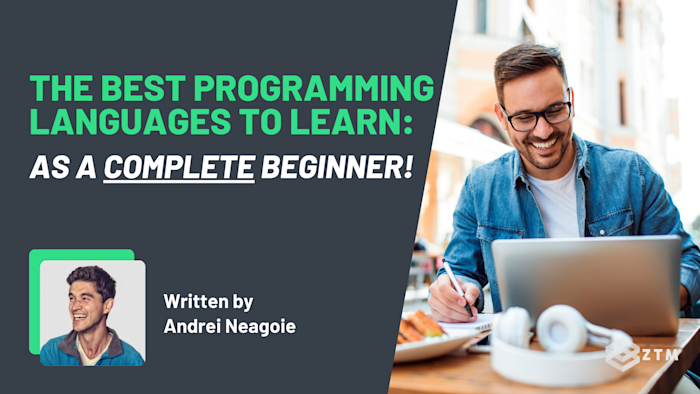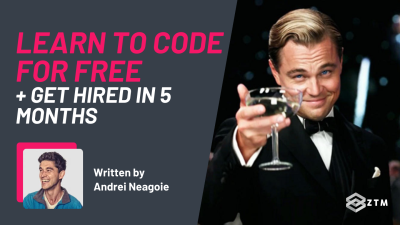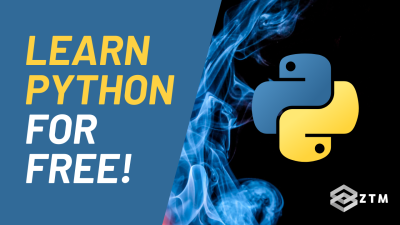
In This Guide:
- Which programming language should I learn first as a beginner?
- Reason #1: Python and JavaScript are both easy to learn for beginners
- Reason #2: Python and JavaScript are both fun to use
- Reason #3: Python and JavaScript are both in high demand and pay well
- Reason #4: Python and JavaScript are the starting foundation for many different career paths
- The reality is that JavaScript and Python open up almost every tech field
- So should I learn JavaScript or Python?
- It's time to choose: Learn Python or JavaScript today
So you’re thinking of learning to code, great choice!
And why wouldn’t you want to? The combination of high salary, the ability to get hired without a degree, the potential of remote work, and getting to work on interesting projects is awesome.
But with over 600+ programming languages, runtimes, and frameworks to choose from, it can be overwhelming to know where to start:
- Which programming language should I learn first? Keep reading :)
- Is there a best beginner programming language? Yes (well, actually there's two 😉)
- Can you get hired with a ‘beginner’ programming language? 100% you can
- Should you learn more than one language? No. At least not at first
- Is it still worth learning a programming language with all these new AI tools? Yes. AI isn't replacing programmers
Let's dive deeper into each of these questions a bit more so you can go from complete beginner to learning to code and getting hired ASAP.
What programming language should I learn first as a beginner?
There are only two programming languages you should choose between as a beginner: Either JavaScript or Python.
Why these two?
Well, the mile-high reasons are:
- They're both beginner-friendly languages ("easy" to learn) and fun to use (yes, I said fun!)
- You can get hired in roles using either language even with no prior coding work experience
- They’re a core skill for many of the most in-demand tech roles (not just web development)
- They provide an amazing foundation as a first step to other career paths
- They're both been around a long time and will be here for years to come so you'll be future proofing yourself
- They both rank in the top 10 best programming languages to learn - regardless of your experience level!
But let's break this down in more detail so you can understand why you should choose either of these as a beginner.
Reason #1: Python and JavaScript are both easy to learn for beginners
When it comes to programming languages, you have two types:
- Low-level languages (ex: C or C++), and
- High-level languages (ex: Python, JavaScript, Java, C#, Rust, etc.)
Low-level languages are very similar to machine code, which is kind of like what you might see in the Matrix.

It’s not that extreme but you get the idea.
This syntax makes these low-level coding languages more difficult to learn though which is why I don’t recommend learning them as your first language.
The only reason I would recommend a low-level language first is if:
- You really love nerding out on code
- Or there is a specific job or company that you want to work for that that uses one of these languages... then of course you'll need to learn whatever they use if you want to get hired there
On the flip side, high-level languages such as Python and JavaScript are more similar to how we speak or write.

This makes them much easier to pick up, and as such, are very beginner friendly.
Reason #2: Python and JavaScript are both fun to use
This probably didn't cross your mind, but when you're learning and using a language every day - you want to make sure that it doesn't drive you crazy with how bad it is to use.
Thankfully Python and JavaScript are pretty enjoyable.
Don't just take my word for it though. According to last year's StackOverflow survey of tens of thousands of developers, both JavaScript and Python are some of the most enjoyable programming languages to use.
- 58.3% of JavaScript users want to keep using it (with higher percentages for offshoots of standard JS - more on these later)
- While 67.62% of Python users want to keep using it next year

The most loved programming language is Rust (84.66% want to keep using it!) and there are some great reasons as to why you might learn Rust. However, it just doesn't have the same level of adoption or wide range of job opportunities that JavaScript and Python give you.
This conveniently leads us to reason #3. of why you should learn either Python or JavaScript first.
Reason #3: Python and JavaScript are both in high demand and pay well
Since Python and JavaScript have been around for so long and are such solid programming languages, almost every company in the world is using one or both of these.
The thing is, companies rarely switch programming languages. It's a big pain and is very costly. It's why the US military had their nuclear program running on huge floppy disks and why PHP is still going strong.
The result of this is a lot of jobs are available with these languages, as companies need to hire developers to help maintain their existing code and help them write new code to create new features and projects.
It also means that there it's very likely to still be a lot of jobs available for people that know Python or JavaScript for many years to come.
For example
If we take a look over on ZipRecruiter for Python and JavaScript jobs, we can see:
- 102,976 jobs available in the US right now that require Python as a key skill
- As well as 45,749 jobs that require JavaScript
Not bad right!? And that's just in the US alone.
As for salary? Well they both pay pretty great right out of the gate:
- $121,932 is the average salary for each of those listed Python jobs, and
- $106,583 is the average for the JavaScript jobs
Both beginner languages. Both 6 figure average salaries.
But it gets better...
Reason #4: Python and JavaScript are the starting foundation for many different career paths
The really cool thing about JavaScript and Python, is that although they are classed as 'beginner' friendly languages, they open up the path to so many other high paying careers (which is another reason they're both such high demand languages to learn).
So let's take a look at some of them.
Web Development
There are 3 main types of Web Developer:
- Front-end devs who build the UI and interface of a website or app. The average salary for this role is around $110,412
- Back-end devs who make everything work under the hood. The average salary for these is around $120,086 per year
- Full-stack devs who work on both frontend and backend tasks. The average salary for these is around $123,262 (with senior roles getting $200,000+)

The thing is, you can use JavaScript to work in any of these 3 roles.
A front-end developer simply needs to know JavaScript (on top of HTML & CSS but you'll pick this up quickly).
You can easily learn to become a front-end dev and get hired. Then, you can skill up further and add more to your JS skills to make your coding even easier and more efficient.
Learning these other front-end frameworks like React or Angular or Vue allow you to build on top of your beginner JavaScript knowledge- meaning higher salaries.
Or you could build really cool 3D experiences by learning Three.js.
Whereas a back-end developer can also start out with JavaScript as a foundation but they'll also need to learn a framework like Node.js plus some SQL + database knowledge. Ideally they'll also have some cybersecurity knowledge as well.
Finally, a full-stack developer would require knowledge of all of these.
The key I'm trying to get across here is that starting with a solid foundation in JavaScript allows you to go in so many different directions within the software and web development world depending on your interests or where the best jobs are.
If you learn JavaScript today, you could get hired as front-end dev almost right away, and then continue to learn additional skills to become a full-stack developer to earn more and get more job opportunities.
Not bad for a beginner language right?
You can technically be a frontend, backend, or full-stack developer using Python as well, it's just not as common. You'll likely just need to learn the Django framework as well.
It's not just websites that you can build either!
Software Development
Want to build software instead of websites and web apps?
Well, you guessed it. Before you do anything in Software Engineering, it's almost guaranteed that you'll need to know either Python or JavaScript to start with.
Sure, you'll have to dive deeper into data structure & algorithms as well as a few other more advanced topics to understand the structure but that's easy enough to pick up if you follow a good course on it.
But it’s a good next step in your career after you learn either Python or JS since the average salary for a Software Engineer is around $147,524.

Cybersecurity/Ethical Hacker
Want to work in Cybersecurity? Then you'll want to pick Python as your first language.
There are other skills and tools you'll need to know as well like Linux and Bash and maybe get a CyberSecurity certification but Python will be a key tool in your toolkit.
The average salary for a Cybersecurity Engineer is around $122,980.

Machine Learning and AI
Notice how Python has a higher average salary right now? Well that's thank in part to the boom in Machine Learning and AI that we've been seeing. That and the fact that almost all of ML and AI is built around Python - including the tools they use.
This means you can learn Python as a beginner and be set up for some of the most future-proof, and in demand careers of 2025.
The average salary for a Machine learning Engineer is around $128,769.

After that, you'll dive into learning machine learning specific tools like PyTorch or Tensorflow. You'll also want to make sure you have a good handle on statistics.
You can follow this step-by-step roadmap to becoming a Machine Learning Engineer from scratch. Or check out this guide if you're interested in learning more about becoming an AI Engineer.
The reality is that JavaScript and Python open up almost every tech field
Can you see how important these 2 ‘beginner languages are?
The list goes on…
- Want to learn Data Science? Learn Python first, then business data analytics, Time series forecasting, and statistics
- Want to become an AWS Engineer? Learn Python, pass your AWS practitioner, and Architect certifications, and then learn Terraform
- Want to work on mobile apps and be a Mobile Developer? Learn Javascript and then learn React Native (which is another JS framework)
What if you want to specialize in a specific language or framework that's hot or certain companies use?
It’s the same situation:
- TypeScript Developer? You need to know JavaScript (at least at a basic level) and then learn Typescript
- React Developer? You need JavaScript, then React
- Vue Developer? You need JavaScript then Vue
- Angular Developer? You need JavaScript, possibly some Typescript, and then Angular
- Rust Developer? This one you could learn as your first language but if you know Python or JS first, you will find learning Rust easier
Even if we go a few steps removed to a specialist tech role, these 2 languages keep coming up as supplementary skills:
- Game Developer? You need to learn either C# or Rust then Unity
- Web3 and Blockchain? You'll likely need to learn Rust or JavaScript as well as Solidity
- UI/UX Designer? Even though you technically don't need to know how to code, you'll be a much better designer and land way more jobs if you have some basic CSS, HTML, and JavaScript skills
- Want to work in DevOps? You start out by learning Linux for network sysadmin skills, supplement it with AWS Cloud certifications, learn Terraform, and then add in either Bash or Python for automation scripting
- Want to be a BI analyst? Even though you usually start out with Excel, Power BI, and VBA, you’ll still likely learn Python to do deeper data analytics and time series forecasting
Ok, I'll stop, as I'm sure you get the idea 🙂!
So should I learn JavaScript or Python?
As you can see, both of these languages are incredibly valuable, easy to learn, in demand, and open up so many other future opportunities.
The best way to choose between the two is to look at a career path or job that you want and that interests you the most, and then see which language is the main requirement.
- If you want to work in data related roles or in AI or Machine Learning - then pick Python
- If you want to build websites and apps? Then learn JavaScript
Both are super easy to learn if you follow either of those courses.
And if you want a step-by-step roadmap to go from complete beginner to getting hired then click here to check out our career paths. They will walk you through any tech career and show you what to learn and how to learn it, all step-by-step.
And if you’re not sure what career you want, try our tech career path quiz.
It’ll ask you questions about the kind of work you want to do, and then provide the best career choice for you.
It's time to choose: Learn Python or JavaScript today
If you're serious about starting a career in tech (whether you choose Python or JavaScript), come join Zero To Mastery.
Our #1 focus is to get you hired as soon as possible - even if you have zero experience (we're not called "Zero To Mastery" for nothing 😉).
We remove all the fluff that you might get elsewhere, and focus on the most important information, skills, and projects you need so that your interviewer says “wow, we have to hire this person!”.

Some students have even got hired in just a few months of learning to code.
Not everyone's journey will be that fast but if you're willing to put in the work, we guarantee that you can also learn to code and get hired!
Oh and did I mention that as a member, you have access to EVERY course that we teach? Try one and if you don't like it, you can try the other. heck you can try any language you want.
Not only that, but when you join, you also get access to our private Discord community, where you can ask questions from teachers like me, as well as other students and working professionals.
All you need to do is pick a language and start learning. You'll go from beginner to hired in no time!





